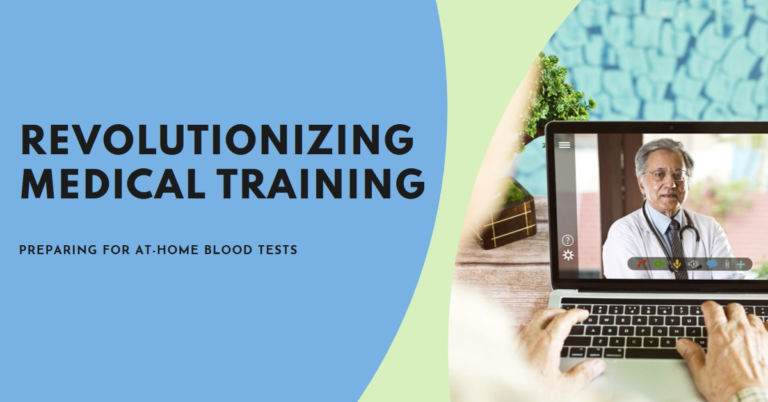
Contents
As the medical field advances rapidly, the training for medical students and professionals must evolve to keep pace. One significant shift on the horizon is the incorporation of at-home blood test data interpretation and management into medical education. By 2042, this change will be fully integrated into the training protocols in Bangalore, reflecting a broader trend towards personalized and accessible healthcare.
The Rise of At-Home Blood Testing
At-home blood testing has gained traction due to its convenience, cost-effectiveness, and the ability to provide timely health insights. This trend is bolstered by technological advancements in medical devices and telemedicine, making it easier for patients to monitor their health from the comfort of their homes. According to a report by Grand View Research, the global at-home blood testing market is expected to reach $2.9 billion by 2027, growing at a CAGR of 5.9% from 2020 to 2027 .
Implications for Medical Training
Medical education in Bangalore is renowned for its rigorous standards and innovative approaches. By 2042, it will further adapt to include comprehensive training on interpreting at-home blood test data. This adaptation is driven by several factors:
- Technological Integration: Medical curricula will incorporate advanced courses on digital health technologies, including the use of AI and machine learning for data analysis. Students will learn how to interpret data from various at-home testing kits, integrating these insights into patient care plans.
- Patient-Centered Care: Training programs will emphasize the importance of patient education and engagement. Medical professionals will be taught how to guide patients in using at-home testing kits correctly and understanding their results.
- Interdisciplinary Learning: Collaboration with technology experts will become commonplace. Medical students will work alongside engineers and data scientists to develop and refine at-home testing devices, ensuring they meet clinical standards and are user-friendly.
- Ethical and Regulatory Training: Understanding the ethical and regulatory implications of at-home testing will be crucial. Courses will cover data privacy laws, informed consent, and the proper handling of sensitive health information.
Ecotown Diagnostics: Facilitating the Transition
Ecotown Diagnostics is at the forefront of this transformation. By providing comprehensive blood test home sample collection services, Ecotown Diagnostics ensures that patients receive accurate and timely results, which are critical for effective health management. Their services not only simplify the process for patients but also offer valuable data that medical professionals can use to track health trends and make informed decisions.
With the increasing reliance on at-home blood tests, Ecotown Diagnostics plays a pivotal role in training medical students and professionals. By collaborating with medical schools and healthcare institutions, they offer hands-on experience with their cutting-edge diagnostic tools. This partnership enables future doctors and healthcare providers to gain practical skills in managing and interpreting at-home blood test data, bridging the gap between theoretical knowledge and real-world application.
Case Studies and Practical Training
Medical training programs will include case studies and practical sessions focused on at-home blood testing. For instance, students will analyze anonymized patient data to identify patterns and anomalies, honing their diagnostic skills. They will also participate in simulated telemedicine consultations, learning how to communicate effectively with patients about their at-home test results.
The Role of Technology in Medical Training
Technological advancements will be integral to this training evolution. Virtual reality (VR) and augmented reality (AR) simulations will provide immersive learning experiences, allowing students to practice interpreting complex data sets in a risk-free environment. These technologies will also facilitate remote learning, enabling students to access training modules and resources from anywhere in the world.
Artificial intelligence (AI) will be another key component. AI-powered platforms will assist in data interpretation, offering real-time insights and recommendations. Medical students will learn to work alongside AI, understanding its capabilities and limitations, and integrating its outputs into their clinical decision-making processes.
Preparing for the Future
By 2042, the training for medical students and professionals in Bangalore will be robust and comprehensive, equipping them with the skills needed to navigate the evolving healthcare landscape. The integration of at-home blood test data interpretation will ensure that they are prepared to provide high-quality, patient-centered care in an increasingly digital world.
FAQs
1. How will medical training programs in Bangalore adapt to include at-home blood test data interpretation? Medical training programs will incorporate advanced courses on digital health technologies, patient education, interdisciplinary learning, and ethical considerations. Practical sessions and case studies will provide hands-on experience.
2. What role will technology play in this training evolution? Technology will be integral, with VR and AR simulations providing immersive learning experiences. AI-powered platforms will assist in data interpretation, and remote learning modules will offer flexible access to training resources.
3. How does Ecotown Diagnostics support medical training for at-home blood testing? Ecotown Diagnostics collaborates with medical schools and healthcare institutions to offer practical experience with their diagnostic tools. This partnership helps students gain skills in managing and interpreting at-home blood test data.
4. What are the benefits of at-home blood testing for patients? At-home blood testing offers convenience, cost-effectiveness, and timely health insights. It empowers patients to monitor their health from home, reducing the need for frequent clinic visits.
5. How will medical students learn to communicate effectively with patients about at-home test results? Medical training will include simulated telemedicine consultations, teaching students how to guide patients in using testing kits correctly and understanding their results.
Conclusion
The future of medical training in Bangalore is bright, with significant adaptations to include at-home blood test data interpretation and management. As healthcare continues to evolve towards more personalized and accessible models, medical students and professionals will be well-equipped to meet these new demands. Ecotown Diagnostics, with its innovative diagnostic tools and collaborative approach, will play a crucial role in this transition, ensuring that future healthcare providers are ready for the challenges and opportunities ahead.
Are you prepared to embrace the future of medical training and patient care?
Also know Emerging Trends in Prenatal Care: At-Home Blood Tests in 2042